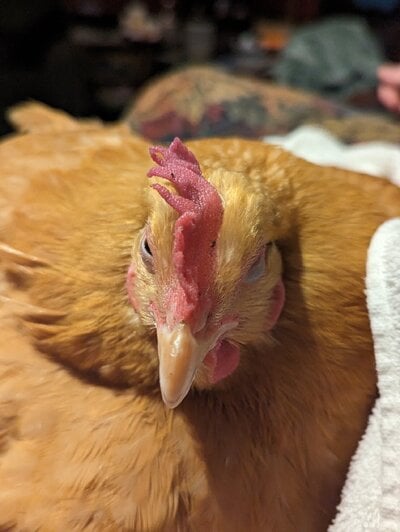Elspeth Dinsmore
Songster
I have an eight and a half month old Buff Orpington (her name is Leeli) that is egg bound. She is panting and can barely stay awake. She can't stand up and doesn't have any balance. She is exhausted.
I brought her inside and she passed some egg yolk. That confirmed my fears.
We soaked her in epsom salt and gave her some tums.
I followed some instructions I found on other threads and reached inside to try and help anything stuck come out. I think she has an egg that is soft-shelled. The egg won't come out. She pushed several times but to no avail. Little bits of egg yolk come out every once in a while. It seems like it may be prolapsed? But I don't even know exactly what that is.
We even tried using a syringe to inject a solution into her vent (1 TBs white vinegar to 1 qt of water).
My mom is running out to the store to get some other supplies.
My whole family is frantically searching for what to do to help her. I'm honestly at my wits end and completely exhausted. Is there anything I can do or will she die? Does anyone have advice for me to try? I love my chickie so much.
I brought her inside and she passed some egg yolk. That confirmed my fears.
We soaked her in epsom salt and gave her some tums.
I followed some instructions I found on other threads and reached inside to try and help anything stuck come out. I think she has an egg that is soft-shelled. The egg won't come out. She pushed several times but to no avail. Little bits of egg yolk come out every once in a while. It seems like it may be prolapsed? But I don't even know exactly what that is.
We even tried using a syringe to inject a solution into her vent (1 TBs white vinegar to 1 qt of water).
My mom is running out to the store to get some other supplies.
My whole family is frantically searching for what to do to help her. I'm honestly at my wits end and completely exhausted. Is there anything I can do or will she die? Does anyone have advice for me to try? I love my chickie so much.
Attachments
Last edited:






